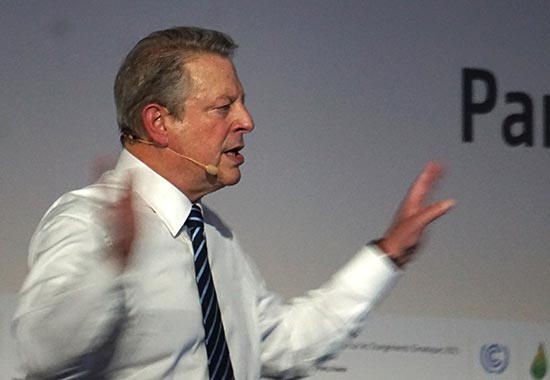Dec. 8, 2015, COP21, Paris
Former Vice President Al Gore brought COP21 delegates and others to their feet in standing ovation with the impassioned close to his address. Gore’s presentation featured slides and video of recent climate related extreme weather events and distressing situations from all across the world, such as the flooding in Chennai, India. There talk featured inspirational images as well, such as the well known picture of the earth from space and mass demonstrations for climate change action.
Excerpt
“The best chance to address this climate crisis is here, now. We have a few days left. Whatever delegation you are following or are a part of use these next 72 hours to double down on your commitment to do the right thing. There are people who have been to previous conferences, and they look back on the long string of them and they’re tempted to conclude, it’s not going to make any difference.â€

“I want them [future generations] to look back at us here in this place, in this hour, on this day, and ask, how did you find the moral courage to break through the impasses, to rise above the differences, to see beyond the difficulties, across them to the bright future that was possible, and see the larger moral question that was at stake.†~ Al Gore
“Every great moral cause that humanity has been faced with was met with a series of ‘no’s and fierce resistance: the abolition movement, the struggle for woman’s suffrage and gender equity which is ongoing, the struggle for civil rights, the struggle against apartheid, the struggle for the end of discrimination on the basis of sexual orientation. All of these moral causes have met ‘no’s and fierce opposition, but they all eventually came down to a single choice, between one of two options, what is right and what is wrong.â€
“In this case, what is right is to save the future of our planet and to say to future generations that we’ve done the right thing here. Make no mistake, the next generation will inherit the earth we bequeath to them, and depending on their circumstances they will ask one of two questions.â€
“If they live in a world in which we have not addressed this crisis, in which we have not taken advantage of the opportunities to create jobs with renewables and sustainable agriculture and fishing and forestry and more efficiency. If they suffer even worse floods and mudslides and droughts and the spreading of diseases into regions where they were unknown previously, the melting of the ice, and the sea level rise and the flows of millions of climate refugees. If they live in such a world, they would be justified in looking back at us, this group of us gathered here in Paris in December of 2015 and asking, ‘What were you thinking? Why did you not act?’â€
“But if they live in a world where there is a renewal of hope, where there are millions of jobs being created, where the carbon concentrations and greenhouse gas concentrations are declining, and where people are living and flourishing, communities with renewable systems and sustainable economies. And if they look at their own children and feel secure in saying to them, you’re world is going to be even better.â€
“I want them to look back at us here in this place, in this hour, on this day, and ask - how did you find the moral courage to break through the impasses, to rise above the differences, to see beyond the difficulties, across them to the bright future that was possible, and see the larger moral question that was at stake.â€
“How did you do it? And part of the answer will be that the men and women who came here to Paris from 195 countries all around the world, came together in support of a higher purpose – to protect our home, to protect our planet earth. We will say to them in answer, we found out that political will was itself a renewable resource.â€
“Thank you very much, Merci Beaucoup.â€
Report by James George
